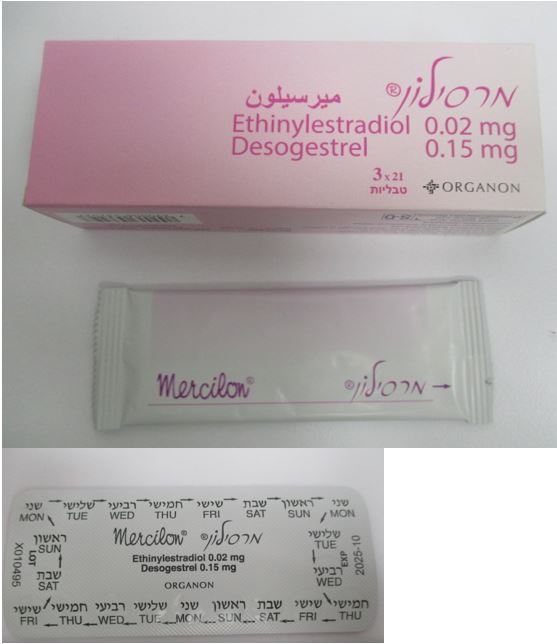Quest for the right Drug

מרסילון MERCILON (DESOGESTREL, ETHINYLESTRADIOL)
תרופה במרשם
תרופה בסל
נרקוטיקה
ציטוטוקסיקה
צורת מתן:
פומי : PER OS
צורת מינון:
טבליה : TABLETS
עלון לרופא
מינוניםPosology התוויות
Indications תופעות לוואי
Adverse reactions התוויות נגד
Contraindications אינטראקציות
Interactions מינון יתר
Overdose הריון/הנקה
Pregnancy & Lactation אוכלוסיות מיוחדות
Special populations תכונות פרמקולוגיות
Pharmacological properties מידע רוקחי
Pharmaceutical particulars אזהרת שימוש
Special Warning עלון לרופא
Physicians Leaflet
Interactions : אינטראקציות
4.5 Interaction with other medicinal products and other forms of interaction 4.5.1 Interactions Interactions between oral contraceptives and other medicinal products may lead to breakthrough bleeding and/or contraceptive failure. The following interactions have been reported in the literature: - Hepatic metabolism: Interactions can occur with medicinal or herbal products that induce microsomal enzymes, specifically cytochrome P450 enzymes (CYP), which can result in increased clearance reducing plasma concentrations of sex hormones and may decrease the effectiveness of combined oral contraceptives, including Mercilon. These products include phenytoin, phenobarbital, primidone, bosentan, carbamazepine, rifampicin, rifabutin and possibly also oxcarbazepine, modafinil, topiramate, felbamate, griseofulvin, some HIV protease inhibitors (e.g., ritonavir) and non-nucleoside reverse transcriptase inhibitors (e.g., efavirenz) and products containing the herbal remedy St. John’s wort. Enzyme induction can occur after a few days of treatment. Maximal enzyme induction is generally observed within a few weeks. After drug therapy is discontinued, enzyme induction can last for about 28 days. Women receiving any of the above mentioned hepatic enzyme-inducing medicinal or herbal products should be advised that the efficacy of Mercilon may be reduced. A barrier contraceptive method should be used in addition to Mercilon during administration of the hepatic enzyme-inducing medicinal product, and for 28 days after discontinuation of the hepatic enzyme-inducing medicinal product. If concomitant drug administration runs beyond the end of the tablets in the current COC pack, the next COC pack should be started right away without the usual tablet-free interval. For women on long-term therapy with enzyme-inducing medicinal products, an alternative method of contraception unaffected by enzyme-inducing medicinal products should be considered. - When co-administered with hormonal contraceptives, many combinations of HIV protease inhibitors (e.g., nelfinavir) and non-nucleoside reverse transcriptase inhibitors (e.g., nevirapine), and/or combinations with Hepatitis C virus (HCV) medicinal products (e.g., boceprevir, telaprevir), can increase or decrease plasma concentrations of progestins, including etonogestrel, the active metabolite of desogestrel, or estrogens. The net effect of these changes may be clinically relevant in some cases. - Concomitant administration of strong (e.g., ketoconazole, itraconazole, clarithromycin) or moderate (e.g., fluconazole, diltiazem, erythromycin) CYP3A4 inhibitors may increase the serum concentrations of estrogens or progestins, including etonogestrel, the active metabolite of desogestrel. -Oral contraceptives may interfere with the metabolism of other drugs. Accordingly, plasma and tissue concentrations may be increased (e.g., ciclosporin) or decreased (e.g., lamotrigine). Note: The prescribing information of concomitant medications should be consulted to identify potential interactions. Pharmacodynamic interactions Concomitant use with medicinal products containing ombitasvir/paritaprevir/ritonavir and dasabuvir, with or without ribavirin, or glecaprevir / pibrentasvir may increase the risk of ALT elevations (see sections 4.3 and 4.4). Therefore, Mercilon-users must switch to an alternative method of contraception (e.g., progestagen-only contraception or non-hormonal methods) prior to starting therapy with this combination drug regimen. Mercilon can be restarted 2 weeks following completion of treatment with this combination drug regimen. 4.5.2 Laboratory Tests The use of contraceptive steroids may influence the results of certain laboratory tests, including biochemical parameters of liver, thyroid, adrenal and renal function, plasma levels of (carrier) proteins, e.g. corticosteroid binding globulin and lipid/lipoprotein fractions, parameters of carbohydrate metabolism and parameters of coagulation and fibrinolysis. Changes generally remain within the normal laboratory range.

שימוש לפי פנקס קופ''ח כללית 1994
Contraception
תאריך הכללה מקורי בסל
01/01/1995
הגבלות
תרופה שאושרה לשימוש כללי בקופ'ח
מידע נוסף
